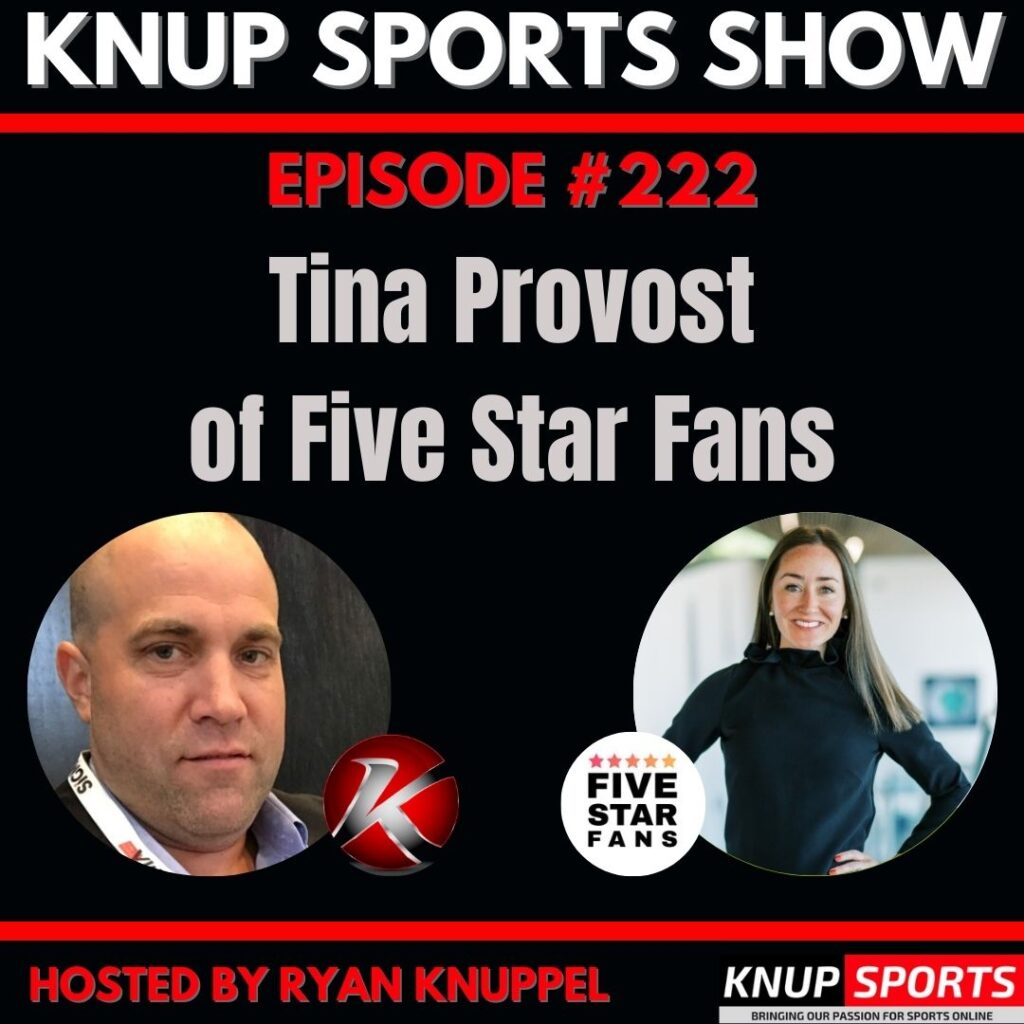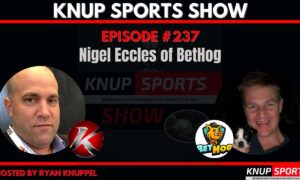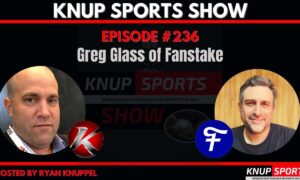Tina Provost of Five Star Fans joins the show for episode 222 to talk about crowdsourcing fan support to recruit & retain athletes to universities.
Watch the Show
Listen to the Podcast
Ryan Knuppel
Hey, what’s going on, everybody? Ryan Knuppel here, Knup Sports Show, episode 222. Thanks so much for joining. We really appreciate it. We love to talk to sports leaders and really introduce you to awesome companies in the sports business world that are doing awesome things. And we have another great guest today that I’m going to introduce you to, and we’ll share a little bit about what they’re doing.
But first off, a little bit of housekeeping. So we have the Canadian Gaming Summit. Canadian Gaming Summit is June 18th to 20th. If you guys are going to this event, make sure to send me a quick message. If not, or if you do not have tickets, use New Partner VIP and you can get a little discount on your tickets. SBC events are amazing. SBC partnered with or acquired Canadian Gaming Summit, so this should be a good one up in Toronto.
All right. That’s a little bit of housekeeping. Let’s dive right into our guest. I’m excited to hear from her and hear what all is going on with this company. Let’s bring on Tina Provost of Five Star Fans. Tina, how are you?
Tina Provost
Hey, good. How are you?
Ryan Knuppel
Tina and a friend. Tina and a friend. I have my assistant, Theo Provost here. Awesome. Awesome. How are you doing, Theo?
Theo Provost
Great. Great. Hi.
Ryan Knuppel
Hey, Theo. What’s going on? Hi. Welcome to the show. Well, Tina, thank you for joining me. I really appreciate it. I know we meant to connect back last month at SBC. Didn’t make that happen, but excited to connect now. So how you been?
Tina Provost
Yeah, same. Good. We’re good. It’s summer in Ohio, so it’s super nice out. We’ve done a lot of meetings outside, but we’re good. Yeah, so we didn’t connect in New York, but here we are. We made it.
Ryan Knuppel
Meetings outside. I’m in Orlando, Florida, and I think right now a meeting outside would be miserable. It’s so hot in Florida. No, thank you.
Tina Provost
Yeah, no. It is that good time of year in the Midwest. I’m originally from Illinois, so I know the small time frame of good weather that you get there, right?
Ryan Knuppel
Yeah, we’re near ending it because then it’s going to get scorching hot here. Awesome. Well, cool. Well, Tina, give us a little background of yourself before we dive into your company and what all you have going on there. Tell us a little bit about yourself and kind of your career path leading up to Five Star Fans.
Tina Provost
Of course. Yeah. I was a Division I athlete from Ohio State University. My business partner and I were cheerleaders at OSU. So we were living on the sidelines just in all seasons, all sports. We were super engaged. And for the past 20 or so years, I’ve still been part of athletics in some capacity. Obviously started as a cheerleader and an athlete at OSU, but then after I graduated, stayed highly engaged on several boards, alumni societies, did some fundraising for scholarships. So we’ve been around it forever.
And in the meantime, since college up until this point, I had a couple of really nice corporate careers. I started in sales for doing some selling recruiting services, and then fortunately got into a really great company, Cardinal Health, that’s here located in Columbus, Ohio. And that’s where I got really deep into my Lean Six Sigma career, where I started to learn more about the statistical analysis about business, change management.
Yeah, Six Sigma. And then I took that from Cardinal Health and led a team in North America for a global animal health company called Covetrus. And that was amazing too. Again, Lean Six Sigma, a lot of change management, but the majority of it all really boils down to people and getting people to be motivated to take information and do something with it.
And then just as NIL became a whole thing in college athletics nearly three years ago, a couple of friends who one of them is now my business partner. We started to talk about, hey, I wonder, could we get back into sports? We love it. It’s given us so much in our life. And so Jennifer and I, we quit our jobs a year and a half ago and started the company and launched our Five Star Fans MVP last summer in July. So we’re almost at our one year anniversary or birthday.
Ryan Knuppel
Wow. Congrats. And congrats. You’re the first person on this show that I can relate to through Six Sigma. I actually am a Six Sigma black belt from my previous job.
Tina Provost
Oh, sweet. That’s one world I don’t ever talk about anymore, but it’s like, oh, you said that. I’m like, yes, I know what you’re talking about.
Ryan Knuppel
Yeah. Well, I mean, gosh, we should probably do a whole other segment on that because it’s super fun. And although it seems like very engineering and like super statistical, it’s a lot of fun. And I’m not a technical person by nature, but the methodology, it’s awesome. And I use it today. I mean, in the startup world, it’s crazy.
Yeah, it certainly helps bridge that gap as, you know, going from corporate to entrepreneurship and business owning and startups. There’s definitely a lot of those principles that you can carry on. Like you said, definitely a topic maybe we can attack in the future. Today, we want to focus on Five Star Fans and what all you have going on with that company. So give us the high level, just the quick pitch of what Five Star Fans is and who it’s serving.
Tina Provost
Okay. We are a sports tech company that happens to be able to pay athletes. So we’ve gamified this experience where college sports fans can crowdsource athletes to a university. And in the meantime, these athletes are capitalizing financially off of their recruiting journey. So how it works, which is what you’re getting to right now, fans will purchase likes within the product. So that internal currency is, they send those likes to players to go to a specific school. So I might say, Ryan, I want you to play for Michigan. So I’m going to give likes in your Michigan bucket.
And other fans might say, no, we want you at Alabama. No, we want you at Ohio State. We want you at Tennessee. And so that kind of competitive gamified experience goes on throughout your recruiting journey. Once you finally enroll in whatever university you choose, all 100% of the dollars in that school’s bucket goes to Ryan in the form of an NIL deal. So that’s where the NIL layers in. It’s a small part of the business model, but we still exist in that space.
Ryan Knuppel
Wow. What happens to the unused funds or the other school, the unfortunate schools that don’t get selected?
Tina Provost
Yeah, it is unfortunate, but they still get some fortune out of it. We did this. There’s some purposeful modeling that we did here. So a lot of us in the college athletic space are hearing a nice buzz phrase called donor fatigue. And right now, athletic departments, collectives, groups, sponsorships, donors, people are competing for the same buckets of money. And we can’t sustain that long term. And we knew that.
And as non-revenue generating female athletes, we also understand sustainability of the revenue generating sports is highly critical to allow our sports to still exist. And so to answer your question, to go back to that, what happens with, let’s say you chose Ohio State, smart choice. But you didn’t go to Penn State. And let’s say the Penn State fans still generated 70 grand to try to get Ryan to go there. Well, we take that $70,000 and we profit share it back with Penn State. We give a portion of that back to the institution.
Yeah. And so we’ve been linking up partnerships with schools and collectives in that regard. And so while as a fan of Penn State, you may not have gotten Ryan to play there, your dollars are still being contributed to the university that you’re very loyal to or a fan of.
Ryan Knuppel
Very cool. Very cool concept. Very innovative. And, you know, when NIL was kind of announced and became a thing, I definitely was, or I think a lot of people were like, oh, there’s going to be some cool things around this. And this is just one of those examples of a cool way to integrate and really help these college kids or incoming college kids. That’s a question I have. Is it only for the high school students or is it for transfer potentials? How are you attacking that?
Tina Provost</h2 >
You nailed it. It’s for both. When we first launched Beta back in July, the initial business model focused solely on recruits. Recruits coming into university have a ton of offers. And while all this fan, recruiter, media attention is surrounding these athletes, we said, well, they should be able to monetize or capitalize somehow too. So that’s kind of how we got started.
But then, you know, there are more than just two stakeholders in college athletics. It’s more than fans and athletes. There are coaches, recruiters, institutions, administrators, and we have to hear and listen to all of those stakeholders so we can change with the industry. We heard not long ago, very passionately and strongly from coaches. They said, we love it. Yes to recruiting. You know, there’s a quote out there that says you can’t out coach recruiting.
But right now, retention is a big deal for us. We’re just trying to sustain our current roster. You know, one school, Howard University, lost a ton of players. Miami lost eight of their basketball players. And that’s painful. And so after we heard that from a lot of different stakeholders, specifically recruiters and the coaches, we said, well, fans are paying a ton of attention to the transfer portal to let them participate in the roster retention.
And so we are about halfway through the Power Five, bringing on the current rosters onto the platform. So now fans can either they can go to a recruit and say, I want you to come to Tennessee or they can say, hey, current Tennessee player, we need you to stay. So they’re going to do the same process where they currency and then send those likes to players they want to keep at the school.
But then even, I mean, then a current Tennessee player may be considering going to Georgia. And so a Georgia fan will come into a current player and say, actually, we can support you better. We really want you to play for us. We have a big gap in our quarterback team, whatever it looks like. So both are available.
Ryan Knuppel
Yeah, it’s really smart and it’s really, you know, cool on a bunch of levels because one, yeah, of course, these students want to make a little money through NIL. So the money side is great. But I think an even cooler part of it is just seeing like, oh, my gosh, all these people want me to go here or want me to stay here. I think that’s just a cool piece as an athlete to like help make that decision for them, right?
Yeah. I mean, obviously, they’re not always going to go with the majority, but it’s really lopsided. It’s like, well, I’m going to get a lot of support here, obviously. So maybe that’s part of that decision making for the athlete as well. So very cool.
Tina Provost
And, you know, I’m glad you said that they might not always go to the highest and we don’t want them to only choose because of that. We want them to choose for good reasons. Is will you get better playing time? Is there better coaching time to get you to the next level and what your goals are. What about your family? Is that a better situation for your family? And so we don’t want to be a leading decision maker. We want to just allow them to capitalize because there’s tons of attention already on them. Let them use that.
And then from the fan perspective, unless you’re a donor or a booster, you don’t have a ton of access or a ton of ways to really participate or have some kind of… So that’s really the core stakeholder is those fans. We now get to say, hey, I helped build that roster. I helped get that guy to that team.
Ryan Knuppel
Very cool. Very cool. So let’s talk about it from the athlete’s perspective. Well, two questions in one. So one, name some of the athletes or talk about some of the athletes that are currently a part of, you don’t have to name them if you don’t want, but I’d be curious of like the athlete lineup. And then the second piece of that is how does an athlete get started with this and how does that process work to actually get started as an athlete?
Tina Provost
Okay, I’ll start with how they get started and then I’ll name a few and give some examples and stories around their experience so far. So how, when we first launched the product, it was very manual and you know how it, you know, in startup and technology, before you automate, you need to simplify. So we did it very manual so we can test and study the process. So the athletes would create their own profile just like you would your Facebook, your Instagram profile.
And then we quickly learned that the easier we could make it for the athlete, the less time they’re spending on their phone and they can spend more on the classroom and on the field. And we also mimicked models from, you know, Huddle does this on three does it. where they create the profile for the athlete. So our development team uses AI to scrape all public data and update it to create the athlete’s profile for them. So now the athlete can claim their profile in less than 30 seconds through a verification process. And of course, if they’re not already on there, then they can always do it manual. Cool.
So that’s the process, super simple. Look for your name, claim your profile. And then a couple of the athletes on there, we started when we launched KJ Bolden was committing 10 days after we launched. So we knew we didn’t have a ton of time with him, but he’s a he was a very influential recruit last summer. And so we spoke with his family and met with them for a while. And he was one of our first ones.
And it was really cool to see how much activity was around him in just the eight days before he verbally committed to his university. Another great athlete and family we’ve worked with is Trey McNutt. He’s just now starting his official visit tour and working with his mom and understanding their needs. We’ve had a wonderful experience with them and he generates quite a bit of activity too. And then another one is Devin Sanchez. They’re out of Texas. And he’s committed to Ohio State and they’ve been a wonderful family too.
That really helps us from a parent perspective. They’re kind of managing their kids journey right now. And so we’ve been able to gain quite a bit from them. Yes, from the athlete and how they want to interact with a product, but also from the parents, because they’re the ones gatekeeping them. All these agents and advisors and vendors and all these different people that want a piece of their son. They help us understand what’s important to them and how to keep them safe. I mean, we have to remember they’re minors. So that’s why you see we have kids too. So as moms, that’s very important to us.
Ryan Knuppel
So you said they claim their profile. So there’s really, I mean, there’s not a, I guess there’s no transactional nature to that. It’s a matter of they come in and then they start getting crowds. Like how does the whole process work on that side? I mean, it’s as simple as that. And is there any auditing on the athletes that come in, which sports are available, that type of thing?
Tina Provost
So from the, I think I heard a question in there. Before the athlete claims the profile, fans can already start to interact with them. So even before Devin Sanchez claimed his profile, his profile was live on our site, so fans could start sending activations. Now, with an athlete claiming, they can then share to their social media, which, of course, is going to drive more traffic and benefit them.
So that, I think I kind of heard a question in there around that. Is that helpful?
Ryan Knuppel
Very, yeah, very, for sure.
Tina Provost
And then from the process perspective, then they can leverage their social media sites. We have our own marketing campaigns and activations where we bring fans to the site to let them know, here are these athletes. Look what you can do. So since it’s new, we have a lot of education. That’s part of our strategy. So that’s been a lot of fun is when we tell people what they can do, they’re like, no way. And then, you know, it’s been fun to see people get excited about it like that.
Ryan Knuppel
Yeah, that’s very cool. Very cool. And then as far as, you know, athletes in which sports, I mean, are you available for like every sport or is it a select number of sports currently?
Tina Provost
We started with college football recruiting. And then we recently, about two months ago, rolled out men’s and women’s basketball. By the end of the year, we’ll have every sport available. What’s difficult, though, is outside of men’s football, men’s basketball, and women’s basketball, the data is not great. And so for our AI team to scrape information about recruits, it’s not as easy. It’s just not out there.
Yeah, so what will happen is we’ll still offer those sports. So a
gymnast can come on and maybe her profile isn’t automatically created by us, but she can do it alone. Yeah. And that is a hundred, we love to do that. But as you’re probably assuming everybody listening, you know, of the 182 million college sports fans in the United States, 156 million are college football. So we had to start where the energy is. And then we’ll keep rolling in more sports.
And as we build out our long-term vision, there are other industries and other leagues that we’ll get into where we can allow a crowdsourcing methodology that fans can start to participate in.
Ryan Knuppel
Wow. Wow. Wow. Wow. Some good stuff. So I think I know the answer to this from, I mean, you obviously being in this space, but you know, there’s a lot of opinions on NIL, right? NIL in general, just the whole athletes get paid. Why are these college kids getting paid? We didn’t get paid when we were athletes and all the above. Back in my day. What’s your general sentiment about, towards NIL. I mean, obviously you’re in business around NIL, so you’re going to like it, but I guess after talking to kids and talking to families and talking to all of the above, you’re really close to the whole space.
Tina Provost
Yeah. I don’t know. Just give us some insight on the space, I guess, from your perspective. Okay. A couple things this is you know we could probably have a whole other episode around this one. First of all, athletes being able to get paid is a good thing. Excuse me Theo, I need to be seen on the camera so you can stay but you need to stay to the side. Thank you. Love you. But what people think, what people are seeing right now are the big flashy stories and athletes getting offered $3 million to move from one school to another, or they get Lamborghinis. And that is a very small percentage of what NIL actually is.
You know, back when I cheered and when I was in school, the whole back in my day, you know, of course, minimal scholarship. But athletes couldn’t even have a job. They couldn’t do summer camps outside of their season. They couldn’t go to the Olympics and then come back and finish their education and play the sport. So NIL has so many other components that are highly beneficial to a student athlete. than just somebody making tons of money and tons of fame and so I think my perspective there is before you start to judge it you got to learn a little bit more but there’s just it’s so complex and I’m going to say this I’m going to get on a tiny bit of a tangent because it’s relevant The industry is changing rapidly, and it is a deep, huge, complex space, college sports.
So there are 1,032 universities that have sports in the United States. Some of the big schools like Ohio State, Texas, they have – not Texas – Ohio State is 36 sports. The NFL only has 32 teams. So when you think about the complexity of college athletics compared to the NFL, it is so much greater than that.
And as we go through change and people have their opinions, you should have an opinion. I also would encourage people to educate and keep reading and keep listening. We’re all trying to change this ship together and it is scary. We don’t know what to expect but if we keep learning as a unit versus trying to compete with each other within the space, I think we’re going to be okay. But you’re never going to get everyone to love it and that’s the reality of life and that’s fine.
But it’s not going to go away. I can say that confidently.
Ryan Knuppel
Anything else about I guess the future of Five Star Fans that you wanted to touch on? Maybe where you’re headed in your journey?
Tina Provost
Yeah, gosh, I know it seems there’s a lot and I touched a little bit on it, but what’s really critical for us is are we doing it right and taking care of people in the industry? There are too many stakeholders that we don’t want to leave out. And sometimes in a startup, it’s hard to manage just one and even like a two-sided market. But our belief system is we have to take care of the entire ecosystem or we’re not going to come out well on the other side of this whole thing as it’s continuing to change.
And so we’re very fortunate we get to do the opening remarks at NACDA this weekend, which is the National Athletic Director Conference. That’s a place where we get to hear from even more stakeholders to say, we’re struggling here. We do need help with crowdsourcing and fan engagement. And that’s where we can, you know, one of the future things that we are building out is this harmonization of data. We’re starting to find when we dig into current rosters and university teams, it’s not all very cohesive and fans can’t find it in one place.
So part of our dev team, our CTO strategy is to harmonize that information so we can continue to offer it to institutions and people so they can understand their university and their alumni deeper.
Ryan Knuppel
Amazing. Awesome. So if fans or athletes want to get started with Five Star Fans, how would they start that journey?
Tina Provost
Yeah, they would go to five-star fans.com. So it looks like it’s on the screen here. And then at the top right corner, you’ll say, are you a fan or are you an athlete? And then you’ll start your process there. Fan profiles take less than 40 seconds and the athlete claim process takes less than 30 seconds. Super quick.
And you always, you know, we’re still learning too. We’re a new company. We’re not even a year old yet. And so please, you can find me on LinkedIn or Instagram and message me anytime if you have feedback, ideas. We love innovation from the outside because if we stay in our silo, we’re never going to grow. So we would love to hear from anybody.
Ryan Knuppel
Awesome. I’ll make sure to put that link to Five Star Fans out in the show notes, and then we’ll tag you in LinkedIn and all the above as well to try to get people connected to you, Tina. Tina, I don’t want to keep you too much longer, but I always like to ask, it sounds like you have a vast knowledge in business. And again, you’ve experienced a lot with a startup here and you have some corporate experience and some process experience and all the above.
I always like to tap into people like you and just, if you have one piece of advice for, you know, maybe an aspiring startup entrepreneur that is trying to get in the game, get in the game and do something. There you go. See how I use that. They’re trying to get into something. Maybe they have a product or a service or an app or something they’re trying to do. What would just be one or two pieces of advice you’d have for that individual jumping into this crazy entrepreneurial space?
Tina Provost
My first piece of advice in general from a business perspective is be yourself. I made a mistake where when I switched gears from being in sales, which is very extroverted people oriented to Lean Six Sigma, which is very engineering focused and statistical. I totally had to change and learn a new concept so I felt like I was in kindergarten again and I was very intimidated because there were a ton of way smarter people than me.
And I was not myself for a little bit. I felt like I had to be more serious and stoic and quiet to be successful in the role, and I was wrong. As soon as I was myself again, I found more success in that field because I could talk to people and actually translate complex information around lean and statistical analysis in an everyday sense. Being myself made me more successful than I ever was. So that’s more of like a general business startup.
I would say, gosh, if you want to start a company, my first question would be why? And if it’s not very strong and you don’t love it to death, don’t do it.
Ryan Knuppel
Yeah. There you go. Yeah, that’s great advice. Yeah, why? And we could get into another episode about that why and what are good whys and what are not good
whys. Okay. Awesome. Well, Tina, any last thoughts, any final words, anything you wanted to say that maybe we didn’t touch on that you wanted to touch on before I let you go?
Tina Provost
No, I think when we talk about sports, people get so excited and energized because sports brings people together in a way that nothing else can do. When you think about your alma mater and a really great player, a leader, a new president, a new coach chooses your alma mater, you’re validated psychologically. You are deeply emotionally connected to sports.
And so we just, the more we, we could talk about it all the time and it’s just fun. And we’re really thankful that you chose us to be on one of your episodes and let us get to talk about something that we seriously love deeply. Obviously, so does my kid or he just likes to interrupt, you know, but I appreciate it a lot. Thank you for having me.
Ryan Knuppel
Yeah, no, the honor’s mine. Thank you for being here, Tina. And I’m looking forward to following the progress of what you guys do. And, you know, I got a college athlete as well. I got a sophomore playing basketball. So they don’t talk a lot about NIL at the D2 level, but you never know. There is a little opportunity for some of those athletes. So it’s interesting, just an interesting time for college athletes for sure.
Tina Provost
It is, yeah. All right, well, that’s – I really appreciate it. And, again, thank you for being here, and hopefully everybody listening enjoyed that as well. So thank you, Tina.
Ryan Knuppel
Yeah, thank you. Good to talk to you. All right, that was Tina Provost of Five Star Fans, Episode 222. Hopefully you enjoyed that. I love the NIL space. I love college athletics. I played college basketball myself back in my day, back before the NIL days and all of the above. But certainly some interesting things happening in that space, and hopefully you enjoyed – Tina taking us down her journey with Five Star Fans and then some of that business advice at the end.
Hopefully some of you can relate to be yourself. Certainly great advice. Be yourself in whatever you’re doing, because nobody’s going to do it like you do it. Even if there’s people doing it, you think better or whatever. The way you do it, the perspective you bring to whatever you’re doing is yours. And so make sure you bring that into it.
All right. That’s all I have for you today. Hopefully you enjoyed this episode. If you want to see other people on this show, please make sure to DM me. You can find me out there anywhere at Ryan Knuppel at KNUP. You’ll be able to find me. Until next time, stay safe and have a good one. Bye-bye.
“`

Relevant Guest Links
- Learn more about Five Star Fans on their website.
- You can connect with Tina Provost on LinkedIn.
More Knup Sports Links
- I refer to Knup Sports often in my show. That’s our sports passion site. Check out KnupSports.com here.
- If you are looking for sports content services you can find more information on the Knup Solutions website.
- Listen to more episodes of the Knup Sports Show.
- Want to be a guest on our show? Setup a time that works here.
- Subscribe to the Knup Sports Show on iTunes here.











